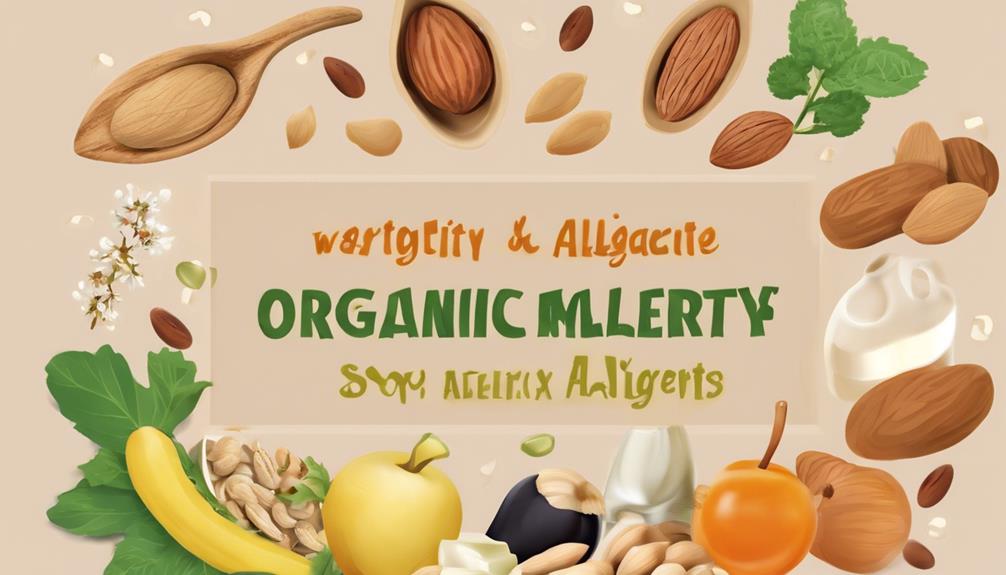Natural Allergy Management With Healthy Foods: a Guide
Experience relief from allergy symptoms naturally with organic foods. Incorporate organic produce like local honey, quercetin-rich fruits, and probiotic foods to alleviate allergies. Prioritize seasonal, organic options to reduce exposure to harmful substances. Try allergy-friendly recipes like ginger-honey tea and turmeric latte. Consider organic supplements for immune support, but consult a healthcare provider first. When shopping, choose certified organic products and explore local markets for fresh options. Beware of common organic allergens and hidden allergens. Opting for organic over non-organic foods can lessen pesticide exposure and lower the risk of exacerbating allergies. Prioritize your health with organic choices.
Benefits of Organic Foods for Allergy Relief
Optimizing your allergy management can be achieved by incorporating organic foods into your diet as they've been shown to provide relief from allergic symptoms. Organic farming practices focus on cultivating produce without synthetic pesticides or fertilizers, which can be beneficial for individuals suffering from seasonal allergies.
Organic foods are grown in a way that avoids the use of synthetic chemicals, which can trigger or worsen allergic reactions in some people. By consuming organic fruits and vegetables, you reduce your exposure to potentially harmful substances that may exacerbate your seasonal allergies. Additionally, organic farming methods often prioritize soil health and biodiversity, which can lead to higher nutrient content in the produce, potentially boosting your immune system and helping you better cope with allergens.
When it comes to seasonal allergies, choosing organic foods can be a wise decision. Research suggests that organic foods may contain higher levels of certain nutrients like vitamin C and quercetin, which have been linked to reducing allergic symptoms. By opting for organic options, you not only support environmentally friendly farming practices but also potentially alleviate your seasonal allergy symptoms. Making small changes like incorporating organic foods into your diet can have a positive impact on your overall well-being and allergy management.
Top Organic Foods for Allergies
To effectively manage your allergies through dietary choices, consider incorporating these top organic foods known for their allergy-relief properties.
- Local Honey: Known for its ability to help desensitize your body to local pollen, consuming a spoonful of local honey daily may reduce symptoms of seasonal allergies.
- Quercetin-Rich Foods: Foods like apples, berries, and onions contain quercetin, a natural antihistamine that can help alleviate allergy symptoms.
- Probiotic-Rich Foods: Incorporating organic yogurt, kefir, or kombucha into your diet can support gut health and potentially reduce food sensitivities that could exacerbate allergies.
- Turmeric: This vibrant spice contains curcumin, which has anti-inflammatory properties that may help alleviate symptoms of seasonal allergies.
- Omega-3 Fatty Acids: Foods like flaxseeds, walnuts, and oily fish are rich in omega-3 fatty acids, which have been linked to reducing inflammation and potentially easing allergy symptoms.
- Leafy Greens: Spinach, kale, and Swiss chard are packed with nutrients like vitamin C and quercetin, which can help combat seasonal allergies.
- Nettles: Nettle leaf tea or cooked nettles can act as a natural antihistamine, potentially providing relief from seasonal allergies.
Incorporating these top organic foods into your diet may help alleviate symptoms of seasonal allergies and reduce food sensitivities, offering a natural approach to managing your allergies.
Incorporating Organic Foods in Your Diet
Incorporate organic foods into your diet to support overall health and potentially alleviate allergy symptoms naturally. Choosing organic options can reduce your exposure to pesticides and other harmful chemicals that may exacerbate allergies. When incorporating organic foods, prioritize seasonal produce. Seasonal fruits and vegetables not only taste better but also pack more nutrients as they're freshly harvested.
To find organic seasonal produce, explore local markets in your area. Local markets often feature a variety of organic options that are in line with the current season. By purchasing from these markets, you can support local farmers while ensuring that you're getting the freshest organic produce available.
Organic foods from local markets can be a great addition to your allergy management plan. These foods are grown without synthetic pesticides and fertilizers, which can be triggers for allergies in some individuals. Additionally, organic foods are often richer in essential nutrients, which can help support your immune system and overall health. Making the switch to organic, seasonal produce from local markets is a practical and effective way to incorporate allergy-friendly foods into your diet while reaping the benefits of fresh, nutrient-dense options.
Organic Recipes to Combat Allergies
Consider trying out these organic recipes as part of your strategy to combat allergies effectively and naturally. Natural remedies and homemade solutions can play a significant role in managing allergies without relying solely on medication. Incorporating these organic recipes into your diet can help alleviate allergy symptoms and boost your overall well-being.
One simple yet powerful recipe is a homemade ginger and honey tea. Ginger has natural anti-inflammatory properties that can help reduce allergy symptoms like nasal congestion and sneezing. Simply steep a few slices of fresh ginger in hot water, add a teaspoon of honey for its soothing effects, and enjoy this comforting tea throughout the day.
Another beneficial organic recipe is a spinach and berry smoothie. Spinach is rich in antioxidants and vitamins that can support your immune system, while berries like blueberries or strawberries are packed with anti-inflammatory properties. Blend a handful of spinach with your favorite berries, a banana for sweetness, and some almond milk for a nutritious and allergy-fighting smoothie.
Lastly, consider making a turmeric and coconut milk latte. Turmeric contains curcumin, a compound known for its anti-allergic properties. Mix turmeric with warm coconut milk, a dash of cinnamon, and a touch of honey for a delicious and soothing drink that can help reduce allergy symptoms. By incorporating these organic recipes into your daily routine, you can harness the power of natural ingredients to combat allergies effectively.
Organic Supplements for Allergy Management
Combatting allergies naturally involves exploring the benefits of organic supplements that can aid in managing allergy symptoms effectively. When looking for natural ways to alleviate allergies, herbal remedies and probiotic supplements are two key organic options to consider.
Herbal remedies have been used for centuries to treat various ailments, including allergies. Butterbur, for example, has shown promise in relieving symptoms of allergic rhinitis, such as sneezing and congestion. Similarly, stinging nettle has anti-inflammatory properties that may help reduce allergic reactions. These herbal supplements can be a valuable addition to your allergy management plan, providing relief in a gentle and natural way.
Probiotic supplements are another organic option that can support your immune system and potentially reduce allergy symptoms. By promoting a healthy balance of gut bacteria, probiotics can help regulate immune responses and decrease inflammation, which may lessen the severity of allergic reactions. Look for organic probiotic supplements that contain Lactobacillus and Bifidobacterium strains for optimal benefits.
When incorporating herbal remedies and probiotic supplements into your allergy management routine, it's essential to consult with a healthcare provider to ensure they're safe and suitable for your individual needs. These organic supplements can complement a healthy diet and lifestyle, offering natural support for managing allergies effectively.
Tips for Shopping Organic for Allergies
To make informed choices when shopping for organic products to manage allergies, prioritize selecting items that are certified organic by reputable organizations. When shopping for organic foods to help with allergies, consider visiting local farmers markets. Farmers markets often offer a variety of fresh, organic produce that can be beneficial for allergy management. These markets provide an opportunity to speak directly with the farmers and learn about their growing practices.
When shopping for organic products, label reading is key. Look for products that are specifically labeled as organic and check for any allergy warnings. Organic foods are grown without synthetic pesticides and fertilizers, making them a healthier option for individuals with allergies. Additionally, organic certification ensures that the food has met certain standards and is free from genetically modified organisms (GMOs).
At the farmers market, you can find a wide selection of organic fruits, vegetables, and other allergy-friendly foods. Take the time to talk to the vendors and ask about their farming methods to ensure that the products meet your allergy management needs. By being mindful of where and how your organic products are sourced, you can make more informed choices to support your overall health and well-being.
Organic Foods to Avoid for Allergies

When navigating organic foods for allergy management, it's important to be aware of specific items that may trigger allergic reactions. While organic foods are generally considered healthier, some organic items can still be allergenic. Here are some organic foods that individuals with allergies should be cautious of:
- Non-Organic Triggers: Organic foods like nuts, soy, wheat, and dairy are common allergens that can cause reactions in sensitive individuals. Even though these foods are organic, they can still provoke allergic responses due to the proteins they contain.
- Allergy-Friendly Alternatives: If you have allergies to common organic triggers, there are allergy-friendly alternatives you can consider. For instance, instead of dairy milk, you can opt for plant-based alternatives like almond milk or oat milk. Similarly, if wheat is an issue, you can explore gluten-free grains like quinoa or rice.
- Hidden Allergens: Some organic foods may contain hidden allergens. Always read labels carefully, as certain organic products might've traces of allergens due to cross-contamination during processing. It's crucial to be vigilant and choose products that are specifically labeled as allergen-free to avoid any unpleasant reactions.
Organic Vs. Non-Organic Allergy Relief
Choosing between organic and non-organic options for allergy relief can significantly impact your overall well-being and symptom management. When it comes to allergies, organic produce is often favored due to its reduced pesticide exposure. Organic fruits and vegetables are grown without synthetic pesticides, which can trigger allergic reactions in some individuals. By opting for organic produce, you can lower your risk of exacerbating allergy symptoms caused by pesticide residues commonly found in non-organic options.
On the other hand, non-organic options may contain higher levels of allergens due to pesticide residues or additives. These substances can potentially worsen allergy symptoms or even trigger new allergic reactions. Choosing non-organic foods could expose you to harmful chemicals that may contribute to inflammation and aggravate your allergies. Additionally, non-organic produce may lack the same nutritional value as organic varieties, which could impact your overall health and immune system function.
Conclusion
In conclusion, incorporating organic foods into your diet can be a beneficial way to manage allergies naturally. By choosing organic options rich in nutrients and antioxidants, you can help alleviate symptoms and boost your immune system.
Remember to consult with a healthcare professional before making any significant changes to your diet or supplement regimen.
Stay informed, make informed choices, and enjoy the benefits of a healthier, allergy-free lifestyle with organic foods.
